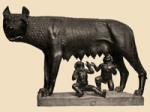
Rome’s legacy is greater than we think – “language, literature, legal codes, government, architecture, engineering, medicine, sports, arts, etc.” – and the Roman Empire has been a powerful myth in the course of the centuries.
After Rome’s fall in 476 CE, the Holy Roman Empire, thus called since 962 CE, started to develop in 800 CE when Pope Leo III crowned Charlemagne in Rome as ‘Emperor and Augustus of the Romans’.
Such Empire, Frankish, Germanic (and later Austrian, dissolved in 1806 only) considered itself as the heir of the “First Rome” (the Western Roman Empire,) while the Hellenized Eastern Roman Empire, Byzantium, was called the “Second Rome” and remained unconquered until 1453 CE.
ψ
When also Byzantium (Constantinople) fell, even the Islamic conqueror Ottoman Mehmed II thought he was continuing the power (and idea) of Rome and tried to “re-unite the Empire” although his march towards Italy was stopped in 1480 CE by both the Papal and Neapolitan armies.
After the fall of the Second Rome someone began to refer to Moscow as the “Third Rome“, since the Russian Tsars felt they were the inheritors of the Byzantine Empire’s Orthodox Christian tradition.
[2014 update: allow us to remind that the sovereigns of the two great continental empires dissolved in WWI, the German and the Russian, both bore the name of Kaiser and Tsar, id est Caesar.
ψ
So many heirs of Rome! Seems like a futile historical game.
It is not.
Let us see how other nations went on claiming the Roman heritage.
The Victorians, the Italians and the USA

The British Victorians, for example, who felt they were somewhat the spiritual successors of the Romans.
Or both the Italian patriots, who unified Italy, and later the Italian dictator Benito Mussolini.
They felt like the heirs of ancient Rome and the creators (again) of a “Third Rome”: after the capital of the Pagan world – they argued – and after the capital of Catholicism, Rome was now to become the capital of a totally New World.
A disproportionate idea, without a doubt.
ψ
And the Americans? They also like today to find similarities between their might and the superpower of the ancient times (try to google America, new, Rome: you’ll get an interesting number of results.)
ψ
We will though today talk about France (skipping Spain for the sake of brevity.)
Can’t France in fact lay claims as well?
The First French Empire
France inherited many elements from Rome, after the conquest of Gaul by Julius Caesar: language, food habits, behaviours, genes, technologies and a fundamental aestheticism, among the rest.
We have already mentioned the connection between Charlemagne and the birth of the Holy Roman Empire. Less obvious are similarities like that between the French Foreign legion and the Roman legions as for training, combat habits, management of terrain (construction of roads etc.) and so on.

Much more significant though is the state tradition of Rome which, according to some scholars, has been preserved in the French monarchic centralism and in the state national spirit of the French people.
The person who shaped this centralism (later continued by Napoleon) was probably Louis XIV (1638 – 1715, see image above,) one of the greatest kings ever. He was called the Sun King (le Roi Soleil) and was associated with Apollo Helios, the Greco-Roman god of the Sun. He also encouraged classicism in the arts and Voltaire compared him to the Roman Emperor Augustus.
Other great personages such as Napoleon Bonaparte (or even Charles de Gaulle, why not) bear the traces of the Roman heritage. Napoleon was inspired first by the Roman Republic. Roman-like, he became First Consul of the French Republic.
Then, after receiving the crown from Pope Pius VII (in Paris, this time) on December 2 1804, he became Emperor of the French people and encouraged a classicist Empire style in architecture, decorative arts, furniture and women’s dresses based on Ancient Hellenic attire (see below,) a style soon popular in most parts of Europe and its colonies.
Napoleon identified himself with Caesar, was continuously studying his works and succeeded in becoming one of the greatest generals ever, like Caesar and Alexander.
The French and the Italians.
Who Envies Who?
Antonio Gramsci, in Notebook IX of his Prison Notebooks, reflects on some words written by Victor Hugo (1802 – 1885) in Histoire d’un crime:
“Every man of heart has two fatherlands in this century: the Rome of the past and the Paris of today … This ancient fatherland – Gramsci argues – associated with the modern one supposes that France is the heir of Rome. Something that was said, and is especially said, today, to displease no small number of people.”
Well, something said to displease whom? Our philosopher probably referred mainly to the Britons and to the Italians.
Focusing on the Italians, one can wander and wonder with Gramsci whether a real francophilia ever existed in our country (Notebook XXVIII.)
France was always admired in Italy – Gramsci observes. France meant the French Revolution, the participation of a large share of the population to the political cultural and state life, it meant a decorous parliamentary activity and many other things that the young Italian state could not exhibit. The Italian francophiles have often concealed a strong dislike and a substantial envy.
I would add that some envy is also felt today by our French cousins when they behold our historical richness, the beauties of our towns etc.
This envy surfaces every time we do something better: with soccer, Ferrari, with the world-wide diffusion of our cuisine & fashion – and so forth.
But let us do ourselves a favour. Let us be honest.
If the French may envy us, we envy them more.

Related posts:
Stress and Joy. Conquest and Sorrow
Julius Caesar’s Conquest Of Gaul. When West / North Europe & The Mediterranean ‘Embraced’ (1)












